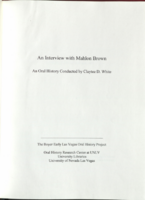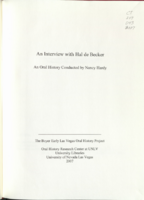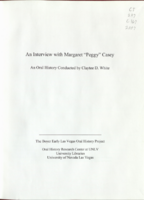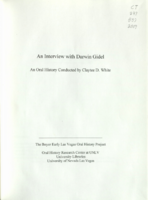Search the Special Collections and Archives Portal
Search Results

Transcript of interview with Mahlon Brown by Claytee D. White, December 16, 2003
Date
Archival Collection
Description
Text

Transcript of interview with Hal De Becker by Nancy Hardy, June 23, 2003
Date
Archival Collection
Description
Text

Transcript of interview with Peggy Casey by Claytee D. White, January 13, 2005
Date
Archival Collection
Description
Text

Transcript of interview with Darren Gidel by Claytee White, October 21, 2009
Date
Archival Collection
Description
Text

Transcript of interview with Robert Bugbee by John. Lopez, March 16, 1981
Date
Archival Collection
Description
Text

Transcript of interview with Robert Bugbee by Karol Sorrells, July 08, 1975
Date
Archival Collection
Description
Text

Transcript of interview with Dolly Kelepecz by Claytee D. White, April 29, 2009
Date
Archival Collection
Description
Dolly Kelepecz loves dance. Her entire life has been filled with the joy of movement. In this interview, Dolly begins with her life growing up in Covina, California and traveling with the Los Angeles Ballet Society as a young dancer. Eventually her career opportunities would have her traverse the globe as a dancer and as a circus entertainer. Her Las Vegas roots took hold in the mid-1970s when she was hired as a dancer in the Bluebells at a 19-year-old. She provides details of being a Las Vegas showgirl, crossing paths with Frank "Lefty" Rosenthal, working with Fluff LeCoque, and becoming a dancer in Stardust's Lido show. Today Dolly is an instructor at UNLV, an important part of her legacy is working with young people. She also explains how she was integral in bringing Pilates to the valley, which continues to be a thriving studio here.
Text

Transcript of interview with Helen M. Baucum by William D. Marshall, February 28, 1975
Date
Archival Collection
Description
Text

Transcript of interview with Charles A. Baumert by James M. Greene, October 31, 1975
Date
Archival Collection
Description
Text

Transcript of interview with Robert N. Broadbent by Seneca Eugene Anderson, March 01, 1978
Date
Archival Collection
Description
Text
